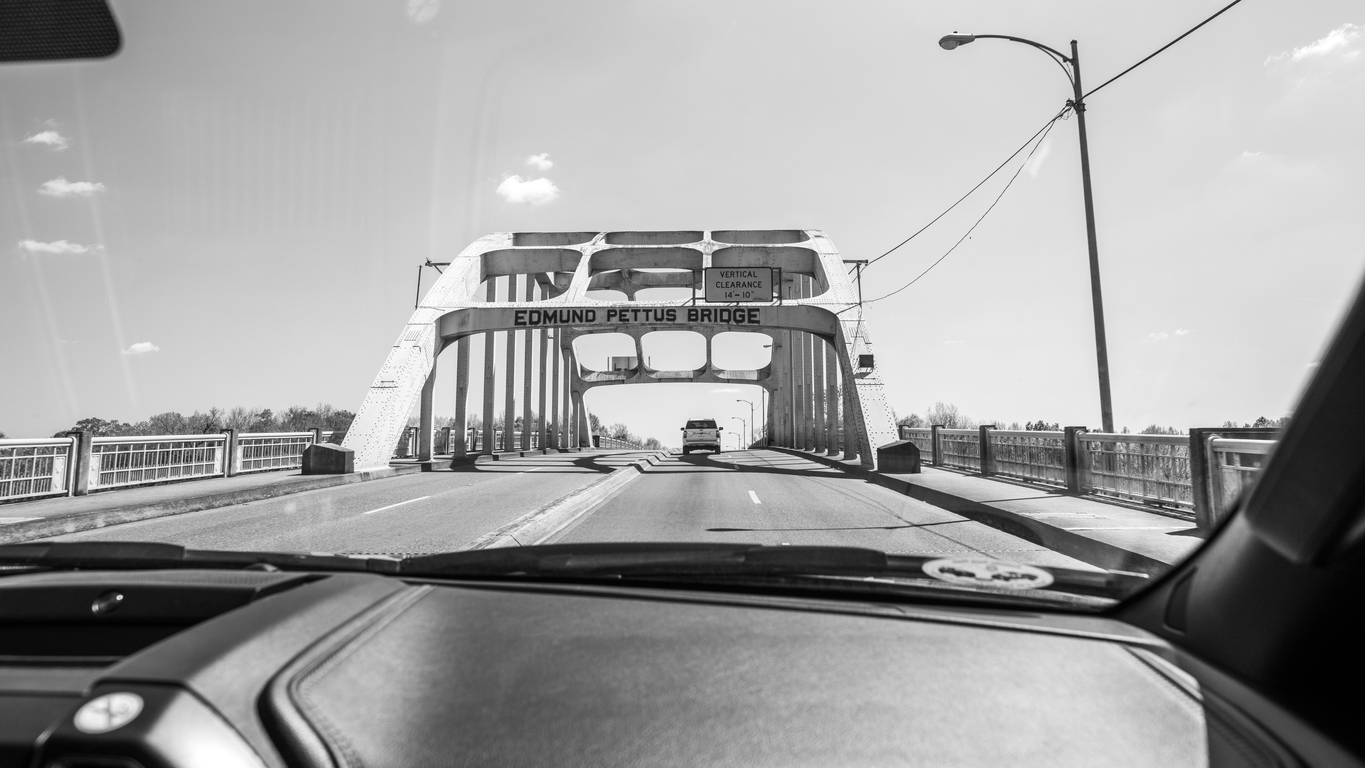Time Period: 1956-1968
Location: Montgomery & Birmingham, AL; Prince Edward County, VA; Washington, DC; Cape May, NJ; New Delhi, India
Main Actors: American Friends Service Committee, Bayard Rustin.
Tactics
– Publishing Dissenting Literature
– Newspapers and Journals
– Marches
This caselet is about Quakers’ contributions to the civil rights movement, which advanced US multi-racial democracy. The civil rights movement’s causes are well known: the southern states were authoritarian enclaves where African Americans were disenfranchised and faced legalized discrimination. Meanwhile, northern states had informal segregation in housing, education, and employment. Despite their small size –just over 75,000 US members today– Quakers served as an important pillar in undoing the US’ authoritarian, exclusive status quo.
Quakers, also known as the Religious Society of Friends, are a Christian denomination noted for their emphasis on direct inward revelations, styles of worship that enable such revelations (e.g., “quaking” silently in place), and forms of social “witness” or activism, especially pacifism and conscientious objection. Much Quaker activism is formulated at “Yearly Meetings,” which are decentralized decision-making organizations.
Quakers’ social witness has earned them international acclaim: Quakers Emily Greene Balch and Philip Noel-Baker won the Nobel Peace Prize in 1946 and 1959 for their contributions to peace. In 1947, the American Friends Service Committee (AFSC) and British Friends Service Council – Quaker-led institutions that focus on advancing peace and social justice – won the prize, accepting it on behalf of Quakers worldwide. In practice, Quakers have not always been maximally progressive on issues of race and democracy such as abolitionism and desegregation. However, Quaker theology has often emphasized ideals of equality, community, and consensual decision-making; these ideals proved useful for pro-democracy activists during the civil rights movement.
Many Quaker activities during the civil rights movement centered around relations between the AFSC, various Quaker meetings and conferences, and civil rights leaders such as Martin Luther King Jr. and Bayard Rustin, the latter a noted Quaker. In 1956, a Quaker Yearly Meeting sent a delegation to Montgomery, AL, which organized with MLK ahead of the Montgomery bus boycott, the first major campaign of the civil rights movement. The Montgomery boycott prompted the Supreme Court in 1957 to rule that segregation was unconstitutional.
In 1957, MLK, Rustin, and over 50 others founded the Southern Christian Leadership Conference (SCLC). Rustin saw the SCLC’s organizing strategies –based on building large, disparate coalitions of labor, civil rights, and political organizers– as informed by Quaker notions of pragmatism and equality. SCLC and Rustin played key roles in organizing the 1963 March on Washington for Jobs and Freedom and 1965 Selma to Montgomery marches, among other landmark protests.
In 1959, the AFSC arranged for MLK’s travel to New Delhi, India, where he became more familiar with Gandhian methods of nonviolence. What MLK gained in terms of his strategic vision proved important to the civil rights movement: as Rustin said, “[we] observe the eternal truth proclaimed by Buddha, Jesus…[Quaker founder] George Fox and Gandhi: the use of violence will destroy moral integrity — the very fundamental of community on which peace rests” (Figueroa 2023, 172).
In 1963, AFSC nominated MLK for the Nobel Peace Prize, which he won. Later that year, they distributed over 50,000 copies of his influential Letter from Birmingham City Jail. In 1968, AFSC participated in the Poor People’s Campaign, working with King and others to draft its platform. Against the backdrop of MLK’s assassination and the campaign’s focus on economic justice, it was largely unsuccessful in extracting concessions from the US government. AFSC also released a statement later that year, where it denounced “a great many Americans, including elected officials…flouting the established law of the land, and…[taking] little action to enforce the law and bring the offenders to account” (AFSC 1968, 2). In other words, AFSC saw formal integrationist measures as inadequate in the face of non-compliance by US government officials.
The US civil rights movement succeeded in ending legal segregation and advancing multiracial democracy in the United States, particularly through the passage of the 1964 Civil Rights Act and 1965 Voting Rights Act. Quaker social witness played an important role in achieving these victories. However, the struggle for multiracial democracy is still incomplete. Democracy activists today would do well to remember how Quaker activists like Bayard Rustin sought to build large, inclusive coalitions, as well as how Quaker organizations like AFSC found inventive ways to broaden the civil rights movement’s horizons, for instance through sending Martin Luther King to India to learn methods of satyagraha. Restoring the quality of US democracy today will require similarly inventive solutions that cut across different political, social, and economic interests.
Where to Learn More
– American Friends Service Committee. (1968). “The Theory and Practice of Civil Disobedience.”
– American Friends Service Committee. (2024). “From India to Birmingham: Martin Luther King, Jr.’s connections with AFSC.”
– Friends Journal. (1958). “Friends General Conference June 23 to 30, Cape May, New Jersey.” Volume 4, Number 28.
– Figueroa, C. (2023). “The Political Activist Life of Pragmatic Quaker Bayard T. Rustin.” In C.W. Daniels & R. Grant (Eds.), The Quaker World, pp. 307-319. Routledge.
You can access all the caselets from the Pillars of Support Project here.

